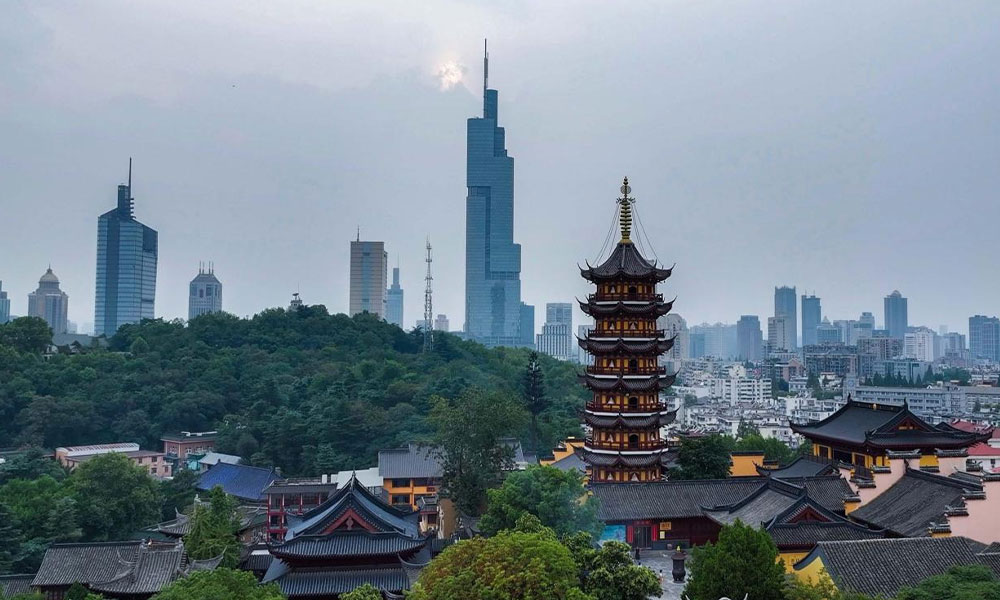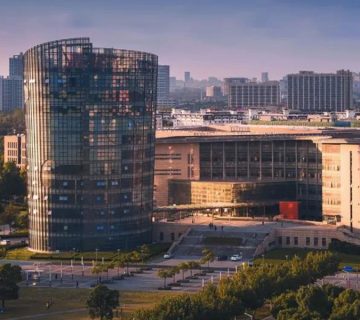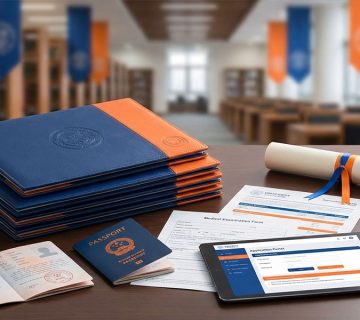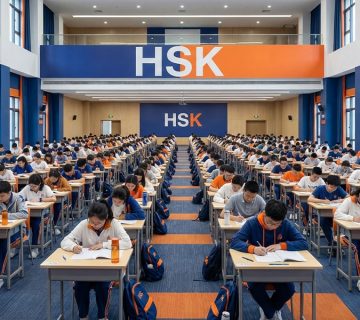Imagine strolling along the Qinhuai River bank at sunset, with lanterns sparkling like fireflies among ancient Nanjing city walls, and the beat of modern life vibrating through skyscrapers in the distance. Such is Nanjing—a city where whispers of imperial dynasties blend with the beat of innovation clusters and high-tech parks. For international students looking for a life-altering study experience, study in Nanjing universities offers more than the degree itself; it offers exposure to one of the world’s most dynamic economies and wealthiest cultures.
In 2025, as China forges ahead to further cement its position as the world’s global leader, admission requirements for Nanjing universities aren’t so much an intellectual undertaking—it’s a bold step towards professional and personal rebirth. Nanjing, or better known as the “Southern Capital,” has been the center of academic endeavor for centuries. Nanjing houses more than 60 universities, hosting more than 20,000 international students from more than 120 countries every year.
This article examines the bottom line: why Nanjing universities are at the top of ambitious students’ list, the easy admission process, and the overall benefits of study China. Regardless of whether you are an engineer, historian, or policymaker of the future, Nanjing can be the beginning of your world experience.

Why Nanjing? A City Designed for Scholars and Dreamers
Study in Nanjing comes with many benefits for international students based on foreign student’s experience. Some of these benefits include:
1. A Great City for Students
The charm of Nanjing lies in its specific function as the bridge between China’s rich past and the high-tech future. Unlike the frenetic energy of Beijing or the cosmopolitan flash of Shanghai, study in Nanjing offers a more livable pace—clean air, green spaces like the expansive Purple Mountain, and a cost of living that’s remarkably accessible. Monthly expenses for students, including housing and meals, hover around 3,000-5,000 RMB (about $420-700 USD), making it easier to focus on studies without financial strain. The city’s clean metro lines and bike-sharing systems connect campuses to historic sites, street food stalls, and technology parks, turning daily travel into mini-adventures.
2. Unique educational system
The pinnacle of Nanjing’s education system are its name-brand universities, perpetually ranked in China’s top positions. The best universities of Nanjing include:
1. Nanjing University
Nanjing University (NJU), established in 1902 as Sanjiang Normal School, is one of this tradition’s pillars. A member of China’s own Ivy League equivalent, the elite C9 League, NJU has a student body of more than 56,000 and is more prominent in physics, chemistry, and environmental studies. Its motto, “Sincerity with Aspiration, Perseverance with Integrity,” speaks to its dedication to all-around development, as seen in its interdisciplinary courses that challenge students to address pressing issues, from climate modeling to ethics in AI.
2. Southeast University
Southeast University (SEU), another behemoth, comes in at 511th in the QS World University Rankings based on QS ranking and has 32,000 students of whom 1,400 are international. SEU is one of the best options for study in Nanjing, renowned for engineering, architecture, and MBBS programs, and its campuses blanket the city. Imagine collaborating on sustainable city proposals in Yangtze River view labs—it’s the kind of hands-on learning that turns theory into reality.
3. Nanjing Normal University
And then there’s Nanjing Normal University (NNU), which has its origins in the Imperial University of 258 AD. With 30,000 students studying in 70 bachelor’s, master’s, and PhD programs in education, humanities, and sciences, NNU is a hotbed of teacher training and Chinese language education. It is among China’s oldest world-opened universities since 1965, offering tailored programs for international students, like a national base for teaching Chinese as a second language.
4. Nanjing Medical University
There are also the likes of Nanjing Medical University (NMU), a global leader in clinical training with English-language MBBS degrees that are certified by the World Health Organization, and Nanjing University of Aeronautics and Astronautics (NUAA), which has cultivated aerospace pioneers for over 60 years. Nanjing’s 22 top universities have created 824,000 research papers and 14.5 million citations, an indicator of their research capability, as per EduRank’s 2025 report. They are not ivory towers in solitude but are constituent universities of Nanjing’s “211” and “985” initiatives, government-backed programs that heavily invest in high-end education, ensuring that the graduates are suited for top management positions in an interconnected world.
4. Multicultural environment
For international students, Nanjing universities emphasize cosmopolitanism. NJU alone has hosted over 20,000 foreigners since 1955, with a multicultural environment via Confucius Institutes and collaborative programs with global partners. Curricula range from short-term Chinese language studies to full English-medium degrees, from business analytics to quantum physics. By 2025, with China’s push for “Double First-Class” universities, expect even more English-medium courses and collaborative initiatives, such as NJU’s collaborations with multinational corporations for AI research.

Navigating Admission: A Clear Path to Enrollment
It is simpler than you think to study in Nanjing universities especially compared to hyper-competitive Western systems. It’s a streamlined, merit-based, and care process with acceptance rates often over 80% for eligible internationals. Here’s a summary of the primary admission requirements, drawn from official policy as of 2025.
1. General eligibility
For undergraduate studies, candidates should have a high school diploma or equivalent, ideally at least a 3.2 GPA on a 4.0 scale. Age criteria vary—over age 16 for undergraduates, 18-60 for postgraduates—but recent graduates are accepted by most programs. Master’s candidates must have a bachelor’s degree, with PhD applicants needing a master’s and relevant research experience. Physical health is also a consideration to study in Nanjing universities: All students submit a Foreigner Physical Examination Form that is valid for six months, including chest X-rays, blood tests, and general checkups.
2. Language skills
Chinese-language majors call for the HSK (Hanyu Shuiping Kaoshi). Undergraduates typically need HSK Level 5 (180+ score), while master’s in liberal arts require Level 6. Those with 12 years of Chinese-medium schooling, however, are exempt, like those from Malaysia or Singapore. English-streams, more common at schools like SEU and NMU, call for IELTS 5.5-6.0 or TOEFL 70-85 (NJU code: C288). No HSK? Start with NJU’s intensive Chinese programs in order to gain credentials.
3. Application process
The application process itself is online and straightforward. You can use websites like NJU’s istudy.nju.edu.cn or CUCAS.cn to upload your documents: copy of passport (with current visa if in China), academic transcripts (translated if necessary), two letters of recommendation, personal statement explaining your goals, and a resume for postgrads. Deadlines are busiest around April-May for September start fall intake and October-November for March start spring intake. Fees are modest—about 400-800 RMB ($55-110 USD) for processing.
Once submitted, receive initial reviews within days, with interviews or exams for very competitive majors like medicine. Admitted? You’ll receive a Confirmation of Admission and JW202 form to apply for your X1/X2 student visa at a Chinese embassy. Register on-campus in original documents; delays require prior approval. Tip: Apply early for scholarships as they can cover tuition (20,000-50,000 RMB/year for undergraduate) and stipends.
For professional courses, like NMU’s MBBS, direct admission eliminates further tests—school transcripts, English test scores, and a refundable deposit of 500 USD against fees. Nanjing’s process as a whole hinge on openness: No Gaokao for foreigners, only good scholarship and enthusiasm. In 2025, with streamlined processes online, it’s never been easier to turn dreams into acceptance letters.

The Bigger Picture: Unleashing the Benefits of Study in China
While study in Nanjing offers the ideal backdrop, the wider benefits of study in China makes the advantages even greater.
1. international reputation
In 2025, more than 500,000 foreign students pour in here, attracted by an education system that’s both venerable and cutting-edge. Why? Begin with quality: China’s universities place in the world top 20 for subjects such as engineering and AI, and Nanjing’s come out on top in citations and patents. C9 members like NJU offer gold-standard degrees that are world-renowned and raise employability levels—graduates are likely to get jobs in multinationals like Siemens or Alibaba after study in Nanjing.
2. affordability
Affordability is a double whammy to study in Nanjing. Nanjing university fees range from 15,000-30,000 RMB ($2,100-$4,200 USD) annually, a fraction of U.S. or UK rates. Add scholarships: The Chinese Government Scholarship covers full fees, lodging, and a 2,500-3,500 RMB monthly stipend to 40% of entrants. Domestic programs, like Jiangsu Provincial Scholarships, amount to up to 30,000 RMB annually. Work up to 20 hours/week is permissible, ranging from on-campus teaching to IT employment, further easing purse strings.
3. Cultural immersion
Cultural immersion priceless. China, a 5,000-year-old civilization, offers daily exposure to customs—learning tai chi in Nanjing parks or savoring xiaolongbao dumplings. Learning Mandarin, the language of one in six people across the globe, sharpens intellect, memory, and professional skills for business or international studies. Safety figures among the priorities too: China is low on crime, with universities offering 24/7 support services and free insurance and orientation.
4. Dynamic economy
Economically, it’s a launchpad. As the world’s second-largest economy, China offers internships at firms like Huawei, fostering networks that span Asia. Studying here builds resilience—navigating bustling markets or high-speed rail teaches adaptability valued by employers. Environmentally, green initiatives like Nanjing’s eco-campuses align with global sustainability goals. And the diversity? Campuses buzz with students from 180 countries, sparking lifelong friendships and perspectives.
Challenges there are—language problems or homesickness—but there are peer mentors and counseling to turn to. By 2025, visa facilitation post-pandemic and hybrid models make it simpler to experience. Ultimately, learning in China is not about a degree; it’s about being bilingual, culturally aware, and ready to thrive in a multipolar world.

Conclusion: Step Into Your Future in Nanjing
As the sun sets over Nanjing’s cityscape, illuminating campuses with spirited argument and exploration in a golden glow of light, it becomes clear: This city and universities are not merely places to study—they’re take-off points for development. From NJU’s historic halls to SEU’s innovation labs, opportunities for study in Nanjing universities are as distinctive as the students who inhabit them.
With simple admission requirements for Nanjing universities that prioritize potential over pedigree and the rich benefits of study in China—from affordability and scholarships to cultural immersion and rapid career advancement—the future is not just possible, but exhilarating. If you are looking to create a bright future in China, get in touch with our consultants with more than thousands of successful cases in the field of student immigration to help you in this path.
FAQ about Study in Nanjing Universities
1. What are the admission requirements for Nanjing universities?
To study in Nanjing universities, applicants need a high school diploma (GPA 3.2+) for bachelor’s, a bachelor’s degree for master’s, or a master’s for PhD programs. Language requirements include HSK 5-6 for Chinese-taught courses or IELTS 5.5-6.0/TOEFL 70-85 for English-taught programs. Submit transcripts, recommendation letters, a statement of purpose, and a health form via platforms like CUCAS.
2. What are the benefits of studying in China through Nanjing universities?
The benefits of studying in China include affordable tuition (15,000-30,000 RMB/year), globally recognized degrees, and scholarships like the Chinese Government Scholarship covering tuition and stipends. Nanjing’s universities, like NJU and SEU, offer cutting-edge research, cultural immersion in Mandarin, and internships with firms like Huawei, boosting global career prospects in a safe, vibrant city.
3. How accessible is it to study in Nanjing universities for international students?
Studying in Nanjing universities is highly accessible, with acceptance rates often above 80% for qualified internationals. The process is streamlined via online platforms like istudy.nju.edu.cn. Nanjing hosts 20,000 students from 120 countries, offering English-taught programs and scholarships. Support like orientation and free insurance ensures a smooth transition





No comment